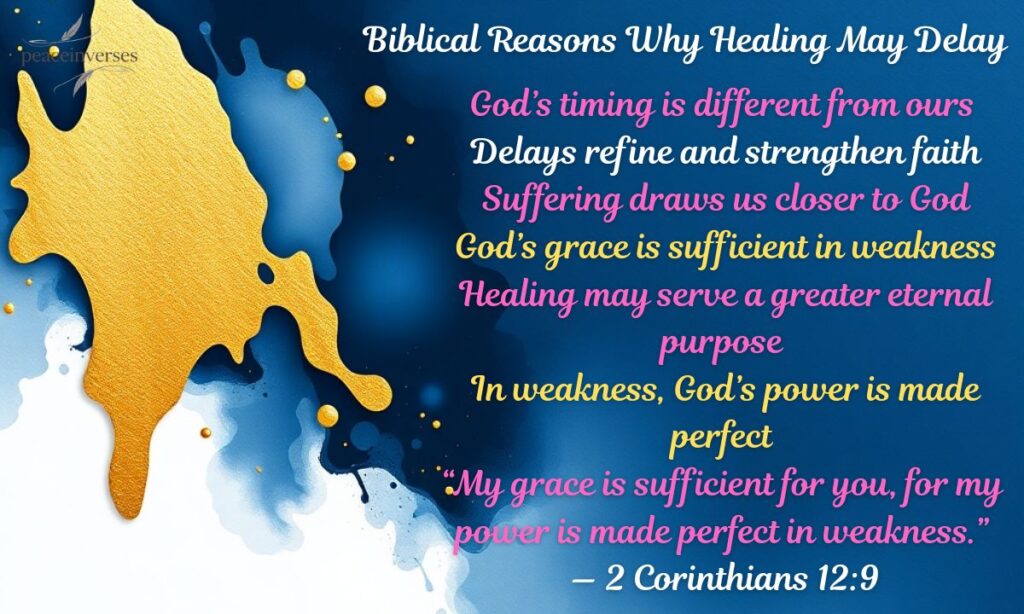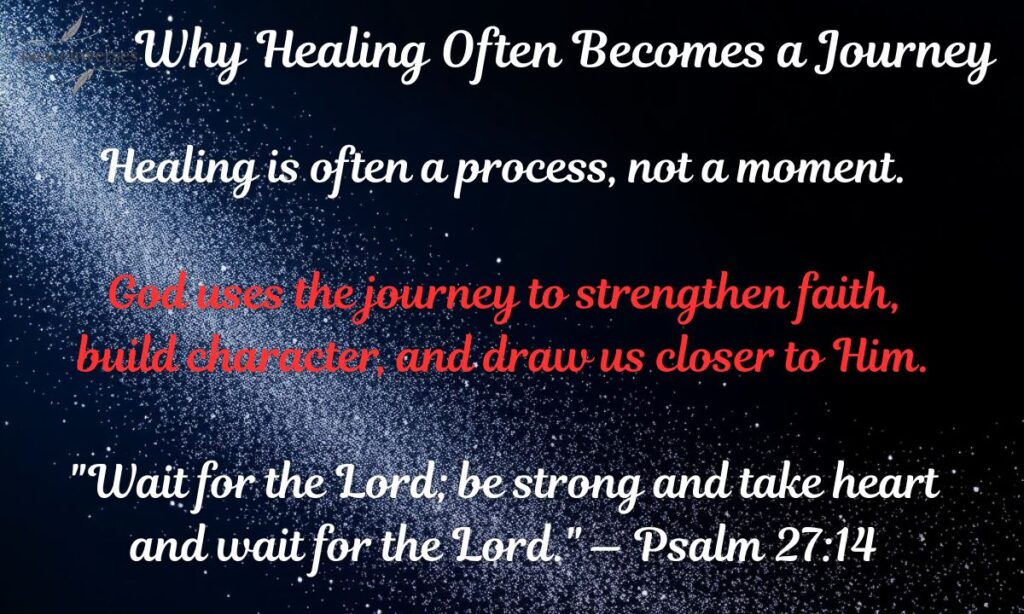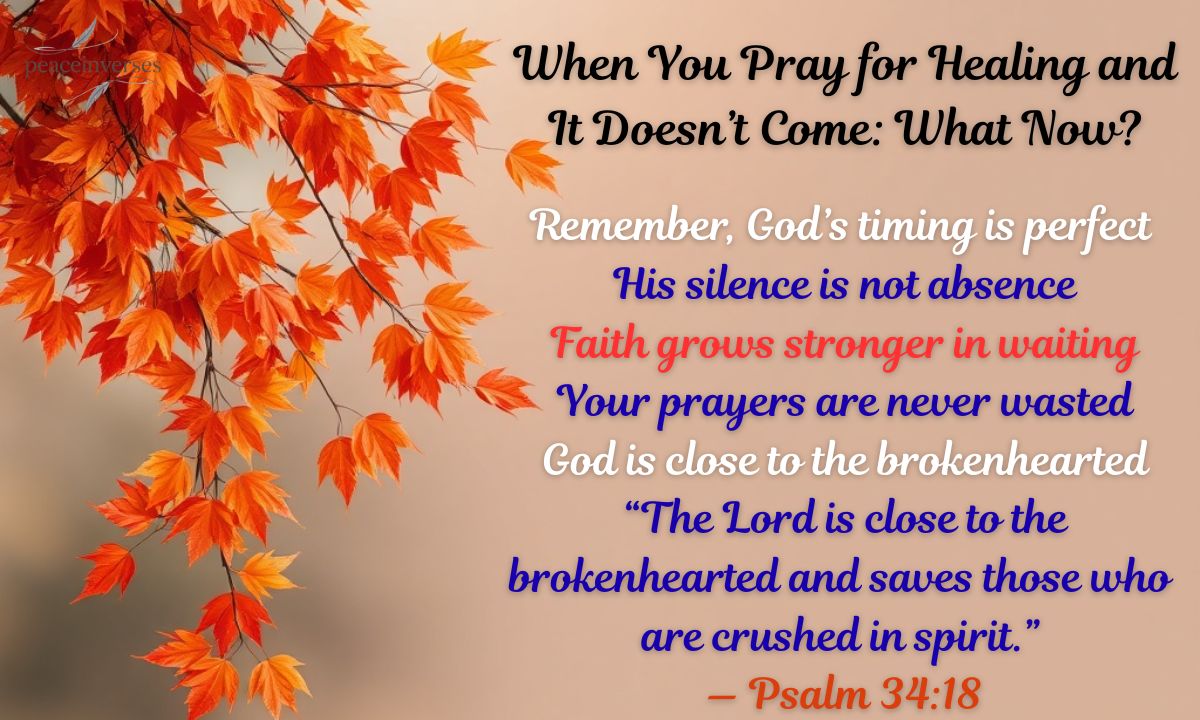When you pray with all your heart for healing and the answer doesn’t come, it can shake your faith. The silence feels heavy, and questions rise: Did God hear me? Did I do something wrong? These moments test not only your patience but also your trust in God’s plan.
Yet the Bible reminds us that God’s timing is not ours, and His ways are higher. Unanswered prayers do not mean God has abandoned you. Sometimes, the waiting carries hidden lessons, unexpected strength, and deeper faith. In the space between prayer and response, God is still at work.
Understanding the Pain of Unanswered Prayers
Praying for healing and not receiving it can feel like carrying a weight too heavy to bear. Many people struggle with confusion, asking why God seems silent when the need is urgent. This silence often leads to deep emotional pain, making them question their faith and God’s love. Yet the Bible assures us that God’s presence does not leave, even in the quiet seasons. The waiting is not absence—it is mystery.
The spiritual turmoil in these moments is real and valid. People may wrestle with guilt, wondering if their prayers are not strong enough or if God is displeased. Others may feel abandoned, as though their cries have vanished into the air.
Scripture reminds us that God hears every prayer, even if the answer is delayed. Psalm 34:18 says, “The Lord is close to the brokenhearted and saves those who are crushed in spirit.”
- Prayer is never wasted, even when healing doesn’t come immediately.
- Pain and doubt are part of a real relationship with God.
- Waiting can lead to unexpected growth in patience and faith.
- God’s silence does not equal God’s absence.
- Spiritual struggle is evidence of desire for closeness with Him.
Biblical Examples of Wrestling with God
The Bible gives us honest stories of people who faced silence and suffering. David often cried out to God in the Psalms, asking why God seemed far away. His words show that questioning God is not a lack of faith but an act of trust—he believed God was listening.
Job endured unimaginable suffering yet continued to pour out his pain in prayer. Their honesty shows that lament is part of faith.
Psalm 13:1 records David’s cry: “How long, Lord? Will you forget me forever? How long will you hide your face from me?” Job, too, asked hard questions, yet God called him faithful.
These stories assure us that our own questions do not push God away. Instead, they bring us into deeper conversation with Him. Wrestling with God in prayer can lead to greater understanding of His character.
- David expressed despair yet always returned to trust in God’s goodness.
- Job lost everything yet declared, “Though he slay me, yet will I hope in him” (Job 13:15).
- Honest prayer builds intimacy with God.
- God welcomes raw emotions and struggles.
- Faith is not about never questioning, but about clinging to Him through the questions.
Biblical Reasons Why Healing May Delay

The Bible teaches that God’s timing is not the same as ours. Sometimes healing does not come right away because God is working in ways we cannot see. Delays can refine faith, shaping us into stronger and more trusting believers.
What feels like silence is often preparation for something greater. 2 Peter 3:8 reminds us, “With the Lord a day is like a thousand years, and a thousand years are like a day.”
Another reason for delay can be God’s larger eternal purpose. Healing in this life is temporary, but spiritual growth lasts forever. Sometimes God allows suffering to draw us closer to Him or to show His power in unexpected ways.
Paul spoke of his “thorn in the flesh” and how God’s grace was enough even without physical healing. 2 Corinthians 12:9 says, “My grace is sufficient for you, for my power is made perfect in weakness.”
- God may delay healing to strengthen faith.
- Suffering can deepen prayer life and dependence on Him.
- Delays shift focus from earthly comfort to eternal hope.
- Trials can display God’s strength in human weakness.
- Every prayer is heard, even if the answer comes in a different way.
Practical Steps When Healing Doesn’t Come
Waiting for healing can feel heavy, but faith invites us to keep moving forward. Instead of giving up, we can continue to pray with honesty and trust. Building a circle of supportive friends or a church family helps carry the weight of waiting.
Shifting focus toward inner renewal allows us to grow spiritually even without physical answers. God’s silence is never absence—it is often an invitation to draw closer to Him.
One practical step is to strengthen your daily prayer life. Even short prayers, spoken in weakness, open the door for God’s comfort. Journaling prayers or writing down what you’re thankful for shifts the heart toward hope.
Surrounding yourself with worship and scripture helps anchor faith when emotions waver. Spiritual renewal begins with surrendering what we cannot control into God’s hands.
Prayer:
“Lord, when healing feels far away, renew my spirit with Your peace. Teach me to wait with patience, faith, and courage. Amen.”
Encouraging Bible Verses for Strength
The Bible is filled with words of comfort for those waiting in pain. These verses remind us that God’s strength carries us when our own feels gone. They assure us that He hears every prayer, even when His answers look different from what we expect. Holding onto these promises keeps the heart steady in long seasons of waiting.
Each verse is a reminder that faith grows in weakness, not just in joy. They point us to God’s unfailing love and His power to sustain us. When healing delays, His Word becomes a lifeline of hope.
Meditating on these scriptures daily can transform fear into quiet strength. They encourage us to trust His plan, even when the road feels unclear.
- Isaiah 41:10 – “Do not fear, for I am with you… I will strengthen you and help you.”
- Psalm 34:18 – “The Lord is close to the brokenhearted and saves those who are crushed in spirit.”
- 2 Corinthians 12:9 – “My grace is sufficient for you, for my power is made perfect in weakness.”
- Philippians 4:6-7 – “Do not be anxious about anything… and the peace of God will guard your hearts and minds.”
- Romans 8:28 – “In all things God works for the good of those who love him.”
Prayer:
“Father, let these promises steady my heart. Give me strength to endure and hope to believe that You are still working in my life.”
Testimonies of Purpose in Pain

Pain often feels meaningless in the moment, but testimonies show how God can turn it into purpose. Monica’s journey with chronic illness became her platform to encourage others who feel unseen.
Through her struggle, she discovered a calling to write and mentor people in their darkest valleys. What looked like weakness became her strength in Christ. God’s purpose often grows out of what we least expect.
Scripture reminds us this truth is not new. Many in the Bible found ministry through hardship. Joseph’s betrayal led to saving nations. Paul’s suffering produced letters that still guide us today. God transforms tears into testimonies and pain into platforms for His glory.
Romans 8:18 – “I consider that our present sufferings are not worth comparing with the glory that will be revealed in us.”
What Not to Say to Those Waiting for Healing
When supporting someone in pain, words matter deeply. Phrases like “You just need more faith” or “Maybe God is punishing you” cut deeper than silence. Instead of rushing to explain, we should simply listen and stand with them. Honest empathy often speaks louder than any answer. Compassion means choosing comfort over clichés.
Better alternatives are gentle reminders of God’s presence. Saying “I’m praying for you” or “You’re not alone in this” reassures the heart. Sometimes the most powerful ministry is sitting quietly and holding space for another’s grief. True support echoes Christ’s love, which never condemns but always comforts.
Proverbs 12:18 – “The words of the reckless pierce like swords, but the tongue of the wise brings healing.”
Short Prayers for the Weary
Here are 10 heartfelt prayers for those tired of waiting, asking God for strength, peace, and renewed faith:
- Lord, give me patience when answers seem far away and remind me You are near.
- Father, carry me when I feel too weak to walk this road alone.
- Jesus, calm my anxious heart and fill me with Your peace that passes all understanding.
- God, teach me to trust Your timing even when I do not understand.
- Lord, restore my hope where despair has taken root in my soul.
- Father, remind me that You are still working all things for my good.
- Jesus, hold me in Your love when pain feels too heavy to bear.
- God, strengthen my faith so it grows even in this long season of waiting.
- Lord, renew my spirit with courage to keep praying without giving up.
- Father, remind me daily that my story is not over, and Your purpose will prevail.
Psalm 34:17 – “The righteous cry out, and the Lord hears them; he delivers them from all their troubles.”
Navigating the Prayer of Faith
The Bible speaks of the prayer of faith in James 5:15, which says, “And the prayer offered in faith will make the sick person well; the Lord will raise them up.” This promise often brings hope, yet it can be misunderstood. Faith is not about forcing God’s hand but about trusting His wisdom and timing. True faith surrenders, knowing that God’s will is higher than our own desires.
Praying in faith means approaching God with confidence, not certainty of outcome. It acknowledges His power to heal while accepting His authority to decide. The prayer of faith rests in God’s character, not in a formula. Healing may come instantly, gradually, or not in this life at all, but faith keeps us anchored in His love.
Insights from Biblical Figures on Unanswered Prayers
Even those closest to God experienced unanswered prayers. Paul pleaded three times for his thorn to be removed, yet God’s reply was, “My grace is sufficient for you, for my power is made perfect in weakness” (2 Corinthians 12:9). This shows that God’s purpose can outweigh immediate relief. Unanswered prayers do not reflect a lack of faith but a deeper plan unfolding.
Timothy, a faithful servant, faced frequent illnesses despite his devotion. Paul advised him to use a little wine for his stomach rather than promising miraculous healing (1 Timothy 5:23). These examples remind us that healing is not always the outcome of prayer, but God’s presence never fails. When healing delays, His strength becomes our sustenance.
Prayer: Lord, help me trust that unanswered prayers do not mean forgotten prayers. Teach me to lean on Your grace and walk in faith, even when healing doesn’t come.
Why Healing Often Becomes a Journey

Healing in the Bible is sometimes immediate, but often it unfolds as a process. God uses the waiting to shape character, refine faith, and deepen dependence on Him. Each step of the journey invites us to trust His hand even when we cannot see the outcome. The process itself can be as transformative as the healing we long for.
This journey also draws us into closer intimacy with God. Waiting keeps us at His feet, learning patience and surrender. In the delay, we discover new layers of His sovereignty and grace. Healing, then, is not just about the body or mind but about the soul being aligned with His eternal purposes.
Psalm 27:14 – “Wait for the Lord; be strong and take heart and wait for the Lord.”
12 Truths to Cling to in the Waiting
Here are twelve biblically grounded truths to hold onto when healing feels delayed:
- God hears every prayer, even when silence feels overwhelming.
- His timing is perfect, never too early and never too late.
- The waiting strengthens faith, shaping endurance for greater battles ahead.
- God’s goodness does not change because circumstances do.
- Healing may be physical, emotional, or spiritual, and God works in all areas.
- Trials can bring us closer to God, teaching deeper dependence on Him.
- Scripture promises that suffering produces perseverance, character, and hope (Romans 5:3–4).
- God’s grace is enough, even when healing does not come as expected (2 Corinthians 12:9).
- Eternal healing awaits in God’s presence, where no sickness remains (Revelation 21:4).
- Every tear and prayer matter to Him; none are wasted.
- The journey can become a testimony that encourages others in their struggles.
- God remains sovereign, loving, and faithful through every unanswered prayer.
Prayer: Lord, help me cling to Your truth in the waiting. Remind me daily that You are good, You are near, and You are working even when I cannot see.
Praying “If God Wills” in Suffering

When healing does not come, prayer often shifts from asking for what we want to trusting in God’s will. Jesus Himself prayed this way in Gethsemane, saying, “Yet not my will, but yours be done” (Luke 22:42). Surrendering to God in suffering does not weaken faith; it strengthens it by placing outcomes in His hands.
Such prayers help us rest in God’s sovereignty. Instead of demanding answers, we lay down our burdens, trusting His wisdom and timing. This surrender allows peace to enter even when the situation has not changed. True healing begins with releasing control to the One who knows all things.
Prayer: Lord, teach me to pray with open hands, trusting Your will above mine. Give me strength to surrender with faith, even in suffering.
Steps for Praying Through Grief and Loss
Grief and loss bring some of the hardest unanswered prayers, especially in the face of terminal illness. The Bible shows us that lament is part of prayer. David cried, “How long, Lord? Will you forget me forever?” (Psalm 13:1). Honest emotions poured out before God are never rejected.
Praying through grief also means leaning on community. Friends, family, and the church can carry prayers when our own voice feels too weak. In loss, God surrounds us with comfort, reminding us we are not alone. Prayer is not only personal; it is shared.
Steps for Praying in Grief and Loss:
- Begin with honesty, bringing your raw emotions before God.
- Use Psalms of lament to give language to your pain.
- Invite trusted believers to pray with and for you.
- Ask for strength to endure each day, one step at a time.
- Rest in God’s promises of eternal life and restoration.
Revelation 21:4 – “He will wipe every tear from their eyes. There will be no more death or mourning or crying or pain, for the old order of things has passed away.”
Prayer: Father, in my grief, hold me close. When words fail, hear my heart. Remind me of the eternal hope You promise in Christ.
Frequently Asked Questions
Why Doesn’t God Always Heal Instantly?
God’s ways and timing differ from ours (Isaiah 55:8-9). Instant healing glorifies Him, but a journey may refine faith or fulfill eternal purposes.
Is It Okay to Question God When Healing Delays?
Yes, God welcomes honest doubts, as seen in David’s cries (Psalm 13:1-2) and Job’s laments. Questioning reflects a real, engaged faith.
Does Unanswered Prayer Mean I Lack Faith?
No, healing isn’t tied to perfect faith. Even Paul’s prayers were denied (2 Corinthians 12:8-9). God’s response reflects His plan, not your deficiency.
How Can I Keep Praying When I’m Discouraged?
Persist with simple, honest prayers, even tears (Romans 8:26). Community support and focusing on God’s presence over outcomes sustain hope.
What Should I Say to Someone Awaiting Healing?
Avoid blame like “You need more faith.” Instead, offer, “I’m praying with you; God is near” (Galatians 6:2), validating their pain.
Can Suffering Have a Purpose Beyond Healing?
Yes, God uses trials to refine faith, draw us closer, or bless others (Romans 8:28). Stories like Monica’s show pain birthing purpose.
How Do I Trust God’s Will When Healing Doesn’t Come?
Pray like Jesus, “Not my will, but Yours” (Luke 22:42). Trust His goodness and sovereignty, knowing He’s weaving a story for eternity.
Conclusion
God’s silence in unanswered prayers can feel heavy, but it does not mean He is absent. His presence walks with us even in the waiting, shaping our faith through every moment. Silence is often God’s way of deepening trust, not denying love.
Ultimate healing may not always come in this life, but eternity promises wholeness beyond pain. We hold to the hope of His perfect timing, knowing His heart is always for us. Trusting Him in the silence anchors us to the eternal truth of His unchanging love.

Muhammad Shoaib is a passionate faith-based writer with over 10 years of experience in creating meaningful content centered around prayers, Bible meanings, scriptural teachings, and heartfelt wishes. He is the lead writer at PeaceInVerses.com, where he shares spiritual insights and uplifting messages to guide and inspire readers on their faith journey.

